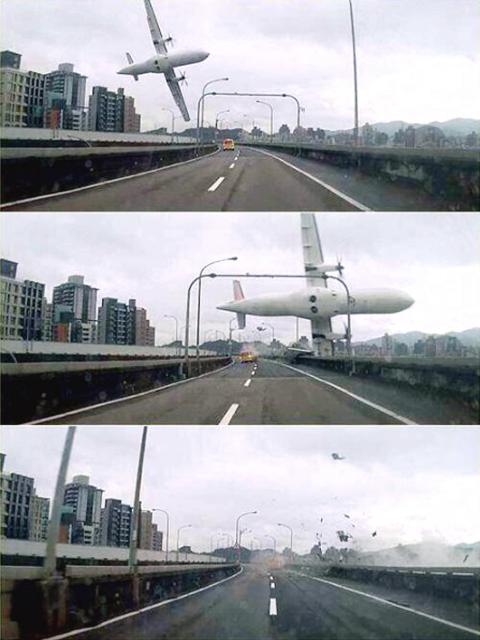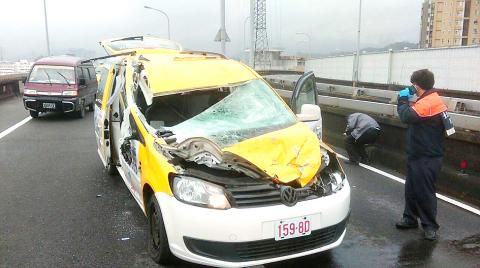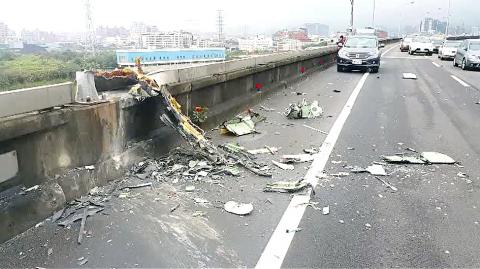The crash of TransAsia Airways Flight GE235 into the Keelung River (基隆河) in Taipei’s Nangang District (南港) yesterday was captured on camcorders mounted in cars, which showed the horrifying final seconds of the plane as its left wing brushed the top of an elevated expressway and a taxi before plunging into the river.
The disaster occurred just before noon, and videos and photographs captured by vehicles and people traveling on the expressway in eastern Taipei were quickly uploaded to YouTube and other social media Web sites.
Dramatic pictures posted by one driver showed the plummeting ATR-72 turboprop aircraft flying on its side with its wings at almost 90o to the ground.

Photo: Screen grab from Twitter
The plane appeared to miss apartment buildings by meters. Footage showed a taxi skidding to a halt on the damaged overpass with small pieces of the aircraft scattered along the road.
The taxi suffered substantial damage to its front end. The taxi driver, surnamed Chou (周), and a female passenger sustained only minor injuries.
Chou said his family did not believe him at first when he telephoned home to say: “I’m OK now. My car got into a crash, it was hit by an airplane.”

Photo courtesy of the Taipei City Police Department
A man surnamed Hsieh (謝) uploaded a video to YouTube (http://youtu.be/eJNAx4BsUtE), saying it came from a camera in a friend’s car.
The terrified reaction of a female passenger can be heard, as she shouts: “Oh, my god” several times.
A security guard surnamed Kao (高) in a nearby building said he could not believe what had happened.

Photo courtesy of the Taipei City Police Department
“I climbed to the rooftop to see the broken-up aircraft in the river,” he said. “It looked like a scene from a Hollywood disaster movie. I cannot forget those dreadful images.”
One witness said the airplane came down between high-rise buildings and that it looked as if the pilot rolled the aircraft to avoid hitting the buildings.
“If it had not hit the expressway, the airplane could have landed on the river. Then we might not have such heavy casualties,” the witness said.
An electrician surnamed Lee (李) doing repair work nearby saw the crash unfold.
“The engine sound got louder. I thought it was a helicopter. Then the airplane, leaving a trail of smoke, plunged into the river. It was so shocking that I dropped the whole wiring bundle on the floor, because I could not stop trembling,” he said.
Cheng Yi-nan (城益男), a security guard at a nearby building, said he heard a roaring sound, followed by a loud bang, then smelled oil burning.
“I thought there was a fire, but later on, we heard news reports of the air crash,” he said.
Additional reporting by Reuters

BUILDUP: US General Dan Caine said Chinese military maneuvers are not routine exercises, but instead are ‘rehearsals for a forced unification’ with Taiwan China poses an increasingly aggressive threat to the US and deterring Beijing is the Pentagon’s top regional priority amid its rapid military buildup and invasion drills near Taiwan, US Secretary of Defense Pete Hegseth said on Tuesday. “Our pacing threat is communist China,” Hegseth told the US House of Representatives Appropriations Subcommittee on Defense during an oversight hearing with US General Dan Caine, chairman of the Joint Chiefs of Staff. “Beijing is preparing for war in the Indo-Pacific as part of its broader strategy to dominate that region and then the world,” Hegseth said, adding that if it succeeds, it could derail

CHIP WAR: The new restrictions are expected to cut off China’s access to Taiwan’s technologies, materials and equipment essential to building AI semiconductors Taiwan has blacklisted Huawei Technologies Co (華為) and Semiconductor Manufacturing International Corp (SMIC, 中芯), dealing another major blow to the two companies spearheading China’s efforts to develop cutting-edge artificial intelligence (AI) chip technologies. The Ministry of Economic Affairs’ International Trade Administration has included Huawei, SMIC and several of their subsidiaries in an update of its so-called strategic high-tech commodities entity list, the latest version on its Web site showed on Saturday. It did not publicly announce the change. Other entities on the list include organizations such as the Taliban and al-Qaeda, as well as companies in China, Iran and elsewhere. Local companies need

CRITICISM: It is generally accepted that the Straits Forum is a CCP ‘united front’ platform, and anyone attending should maintain Taiwan’s dignity, the council said The Mainland Affairs Council (MAC) yesterday said it deeply regrets that former president Ma Ying-jeou (馬英九) echoed the Chinese Communist Party’s (CCP) “one China” principle and “united front” tactics by telling the Straits Forum that Taiwanese yearn for both sides of the Taiwan Strait to move toward “peace” and “integration.” The 17th annual Straits Forum yesterday opened in Xiamen, China, and while the Chinese Nationalist Party’s (KMT) local government heads were absent for the first time in 17 years, Ma attended the forum as “former KMT chairperson” and met with Chinese People’s Political Consultative Conference Chairman Wang Huning (王滬寧). Wang

CROSS-STRAIT: The MAC said it barred the Chinese officials from attending an event, because they failed to provide guarantees that Taiwan would be treated with respect The Mainland Affairs Council (MAC) on Friday night defended its decision to bar Chinese officials and tourism representatives from attending a tourism event in Taipei next month, citing the unsafe conditions for Taiwanese in China. The Taipei International Summer Travel Expo, organized by the Taiwan Tourism Exchange Association, is to run from July 18 to 21. China’s Taiwan Affairs Office spokeswoman Zhu Fenglian (朱鳳蓮) on Friday said that representatives from China’s travel industry were excluded from the expo. The Democratic Progressive Party government is obstructing cross-strait tourism exchange in a vain attempt to ignore the mainstream support for peaceful development